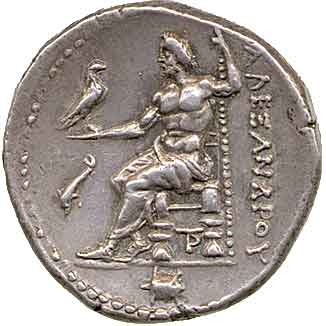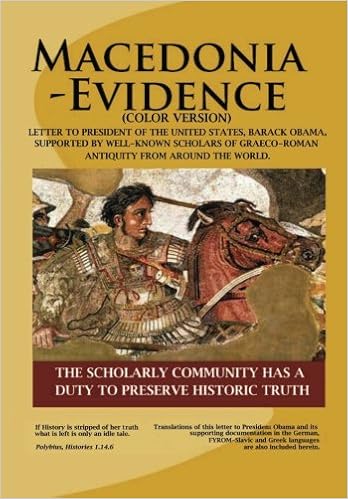
Macedonian coin, stating in Greek: "ΑΛΕΞΑΝΔΡΟΥ"
(in English: "ALEXANDER'S")
...by Frank L. Holt
Professor of Ancient History
University of Houston
University of Houston
PROLOGUE
Μακεδονίαν καί τήν άλλην Ελλάδα
Arrian
Μακεδονίαν καί τήν άλλην Ελλάδα
Arrian
[...] Τα κείμενα που ο Αλέξανδρος μελετούσε ως νεολαία ήταν ελληνικά.
Τα βιβλία που διάβασε ενώ ήταν στην Ασία ήταν ελληνικά.
Οι ήρωες που εξομοιώνει, οι θεοί που λάτρευε, οι ναοί που έκτισε ήταν ελληνικοί.
Τα κέρματα που έκοβαν στα εκατομμύρια ήταν ελληνικά.
Η κληρονομιά που άφησε πίσω από την Ανατολία στην Ινδία ήταν τόσο ελληνική όσο
και οι έποικοι της, με το θέατρο, το γυμνάσιο και το εγγεγραμμένο αντίγραφο των
Δελφικών μεγισμών σε μια μακρινή γωνία του Αφγανιστάν.
Το να λέει ότι το βασίλειο του Αλεξάνδρου ήταν κατά κάποιο τρόπο εκτός βάρους με
τις πόλεις-κράτη στο νότο δεν είναι παρά ένα επιχείρημα εναντίον της ελληνικής κληρονομιάς του. αυτό σημαίνει μόνο ότι η Μακεδονία παρέμεινε περισσότερο ομηρική
από την Αθήνα, τη Θήβα ή τη Σπάρτη. Είναι δύσκολο να είσαι πιο ελληνικός από αυτό.
Ούτε πρέπει να μας απασχολεί η ικανότητα του Αλεξάνδρου να μιλάει μια μακεδονική διάλεκτο ή το ενδιαφέρον του για τον κόσμο πέρα από την ίδια την Ελλάδα.
Ο Αλέξανδρος ήταν άνθρωπος του κόσμου, σίγουρα, αλλά ήταν άνθρωπος από την πΓΔΜ.[...]
Τα βιβλία που διάβασε ενώ ήταν στην Ασία ήταν ελληνικά.
Οι ήρωες που εξομοιώνει, οι θεοί που λάτρευε, οι ναοί που έκτισε ήταν ελληνικοί.
Τα κέρματα που έκοβαν στα εκατομμύρια ήταν ελληνικά.
Η κληρονομιά που άφησε πίσω από την Ανατολία στην Ινδία ήταν τόσο ελληνική όσο
και οι έποικοι της, με το θέατρο, το γυμνάσιο και το εγγεγραμμένο αντίγραφο των
Δελφικών μεγισμών σε μια μακρινή γωνία του Αφγανιστάν.
Το να λέει ότι το βασίλειο του Αλεξάνδρου ήταν κατά κάποιο τρόπο εκτός βάρους με
τις πόλεις-κράτη στο νότο δεν είναι παρά ένα επιχείρημα εναντίον της ελληνικής κληρονομιάς του. αυτό σημαίνει μόνο ότι η Μακεδονία παρέμεινε περισσότερο ομηρική
από την Αθήνα, τη Θήβα ή τη Σπάρτη. Είναι δύσκολο να είσαι πιο ελληνικός από αυτό.
Ούτε πρέπει να μας απασχολεί η ικανότητα του Αλεξάνδρου να μιλάει μια μακεδονική διάλεκτο ή το ενδιαφέρον του για τον κόσμο πέρα από την ίδια την Ελλάδα.
Ο Αλέξανδρος ήταν άνθρωπος του κόσμου, σίγουρα, αλλά ήταν άνθρωπος από την πΓΔΜ.[...]
*μεταφρασμένο...απόσπασμα από το βιβλίο

This is Prof. Holt's Prologue from the
book "Macedonia-Evidence"
Το βιβλίο αυτό περιέχει υλικό που προέρχεται από τον ιστότοπο
http://macedonia-evidence.org/ ο οποίος περιλαμβάνει την επιστολή προς
τον Πρόεδρο των Ηνωμένων Πολιτειών Barack Obama, υποστηριζόμενη από
γνωστούς μελετητές της Graeco-Roman Antiquity από πανεπιστήμια,
ερευνητικά κέντρα και ακαδημαϊκά ιδρύματα σε όλο τον κόσμο.
Η ώθηση για το έργο αυτό προέκυψε από τη διαμάχη μεταξύ Ελλάδας και ΠΓΔΜ
για το όνομα «Μακεδονία», το οποίο παρήγαγε και διαδόθηκε παραπληροφόρηση
και ανακρίβειες σχετικά με την αρχαία Μακεδονία και το βασιλιά της, τον Αλέξανδρο.
Οι μελετητές που είναι γνωστοί για την εμπειρία τους στη γκρεκο-ρωμαϊκή αρχαιότητα έχουν σχηματίσει μια ad hoc ομάδα για να παρουσιάσουν, να εξετάσουν και να
συζητήσουν τα ιστορικά στοιχεία σχετικά με την αρχαία Μακεδονία και τον
Μέγα Αλέξανδρο!!!!!
book "Macedonia-Evidence"
Το βιβλίο αυτό περιέχει υλικό που προέρχεται από τον ιστότοπο
http://macedonia-evidence.org/ ο οποίος περιλαμβάνει την επιστολή προς
τον Πρόεδρο των Ηνωμένων Πολιτειών Barack Obama, υποστηριζόμενη από
γνωστούς μελετητές της Graeco-Roman Antiquity από πανεπιστήμια,
ερευνητικά κέντρα και ακαδημαϊκά ιδρύματα σε όλο τον κόσμο.
Η ώθηση για το έργο αυτό προέκυψε από τη διαμάχη μεταξύ Ελλάδας και ΠΓΔΜ
για το όνομα «Μακεδονία», το οποίο παρήγαγε και διαδόθηκε παραπληροφόρηση
και ανακρίβειες σχετικά με την αρχαία Μακεδονία και το βασιλιά της, τον Αλέξανδρο.
Οι μελετητές που είναι γνωστοί για την εμπειρία τους στη γκρεκο-ρωμαϊκή αρχαιότητα έχουν σχηματίσει μια ad hoc ομάδα για να παρουσιάσουν, να εξετάσουν και να
συζητήσουν τα ιστορικά στοιχεία σχετικά με την αρχαία Μακεδονία και τον
Μέγα Αλέξανδρο!!!!!
ΤΟ ΠΡΩΤΟΤΥΠΟ
PROLOGUE
Μακεδονίαν καί τήν άλλην Ελλάδα
Arrian
Arrian
The documents comprising this book speak forcefully for the proposition that the history of ancient Macedonia, including the brilliant reigns of Philip and his son Alexander, belongs squarely in the cultural, economic, political, religious, and military history of Hellenism. The cultural milieu of the Macedonian court was Greek. The texts that Alexander studied as a youth were Greek. The books he read while in Asia were Greek. The heroes he emulated, the gods he worshipped, the temples he built were Greek. The coins he minted in the millions were Greek. The legacy he left behind from Anatolia to India was as Greek as his settlers could make it, right down to a theater, gymnasium, and inscribed copy of the Delphic maxims in a far corner of Afghanistan. To say that Alexander’s kingdom was in some ways out of step with the city-states to the south is hardly an argument against his Hellenic heritage; it only means that Macedonia remained more Homeric than Athens, Thebes, or Sparta. It is hard to be more Greek than that. Nor should we be troubled by Alexander’s ability to speak a Macedonian dialect or by his interest in the world beyond Greece itself. Alexander was a man of the world, certainly, but he was a man from Macedonian Greece. According to Arrian 2.14.4, Alexander said this himself in a letter to the Persian king Darius:
Alexander sent a reply to Darius by way of Thersippos, who went back with the Persian envoys. Alexander’s letter states as follows: “Your ancestors invaded Macedonia and the rest of Greece, inflicting evils upon us without provocation…”
Here Alexander’s point seems clear—Macedonia was historically a part of Greece.
A widening academic consensus on this matter may be witnessed among the many signatories to another epistle of more recent composition, addressed to President Barack Obama. That letter, too, cites history in order to show the connection between Macedonia and the rest of Greece. This unusual appeal to an American leader arises from a decision by the United States to recognize as the ‘Republic of Macedonia’, with all of its historic implications, what had previously been called the Former Yugoslav Republic of Macedonia, or Skopje. But why should a decision of this kind stir a strong reaction, particularly among ‘ivory-tower’ academics? Is not the new name just an economy of words? Does not every nation have the sovereign right to adopt any name it chooses? Not really, for in many cases claims follow names: historic, ethnic, and even territorial.
The crux lies less in the politics of 2004, when a former administration took this action, than in the pages of a work whose title bears a date twenty years earlier. In George Orwell’s 1984, penned in 1948 by an author aware of why words and ideas matter, the motto of Big Brother and his insidious Ministry of Information highlights the dangers of historical distortion: Who controls the past controls the future; who controls the present controls the past. Real power resides not in the technologies of war or totalitarianism, but rather in that ancient invention of the Greeks called history. The past matters, and more than most people in Orwell’s world—or ours—may realize. The future surely fascinates us, but it has no force. It merely waits while the past drives the present. On the train-tracks of time, the engine has always been in the back, pushing rather than pulling. Thus, the past cannot be unhooked and unheeded as so much dead weight. Nor can it be left in the hands of the wrong engineers: Whoever controls the past determines the future, and that ultimately depends upon who in the present is shaping the past. Parliaments? Pundits? Preachers? Poets? Presidents? Who controls the present must choose carefully whom to trust with our past, else a false and monstrous future may result. At the very least, Mr. Presidents and Madam Secretaries and Peoples of the World, please consider carefully the contents of this book and the credentials of those who have contributed to it.
Frank L. Holt
Professor of Ancient History
University of Houston
Professor of Ancient History
University of Houston

Δεν υπάρχουν σχόλια:
Δημοσίευση σχολίου